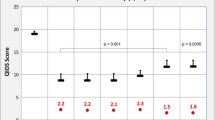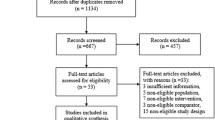Abstract
Adherence to antiretroviral therapy (ART) among HIV-infected individuals is necessary to both individual and public health, and psychosocial problems have independently been associated with poor adherence. To date, studies have not systematically examined the effect of multiple, co-occurring psychosocial problems (i.e., “syndemics”) on ART adherence. Participants included 333 HIV-infected individuals who completed a comprehensive baseline evaluation, as part of a clinical trial to evaluate an intervention to treat depression and optimize medication adherence. Participants completed self-report questionnaires, and trained clinicians completed semi-structured diagnostic interviews. ART non-adherence was objectively measured via an electronic pill cap (i.e., MEMS). As individuals reported a greater number of syndemic indicators, their odds of non-adherence increased. Co-occurring psychosocial problems have an additive effect on the risk for poor ART adherence. Future behavioral medicine interventions are needed that address these problems comprehensively, and/or the core mechanisms that they share.
Resumen
Entre las personas VIH-positivas, adherencia a los tratamientos antirretrovirales (ART por sus siglas en inglés) es clave para la salud personal y la salud pública. Problemas psicosociales han sido independientemente asociados con un bajo nivel de adherencia. Estudios científicos aun no han examinado el impacto en la adherencia al ART dentro del contexto de coocurrencia de varios problemas psicosociales (“syndemics”). Personas VIH-positivas (N = 333) completaron una evaluación de línea base, como parte de su participación en un ensayo clínico donde el propósito fue examinar una intervención para el tratamiento de la depresión y mejoramiento de adherencia a los medicamentos. Los participantes completaron un autoinforme y también una entrevista diagnóstica semiestructurada. El nivel de adherencia al ART fue medido a través de un tapón de botella electrónica (sistema MEMS). Con cada indicador de “syndemics” que fue reportado por los participantes, sus probabilidades de no adhesión aumentaron. La coocurrencia de varios problemas psicosociales resultan en un impacto aditivo al riesgo de tener pobre adherencia al ART. Para enfrentar estos problemas de manera integral se necesita el desarrollo de intervenciones basadas en la medicina conductual y mejorar el entendimiento de los mecanismos fundamentales los cuales tienen en común.

Similar content being viewed by others
References
Blashill AJ, Perry N, Safren SA. Mental health: a focus on stress, coping, and mental illness as it relates to treatment retention, adherence, and other health outcomes. Curr HIV/AIDS Rep. 2011;8:215–22.
Bing EG, Burnam MA, Longshore D, Fleishman JA, Sherbourne CD, London AS, et al. Psychiatric disorders and drug use among human immunodeficiency virus-infected adults in the United States. Arch Gen Psychiatry. 2001;58:721–8.
Gonzalez JS, Batchelder AW, Psaros C, Safren SA. Depression and HIV/AIDS treatment nonadherence: a review and meta-analysis. J Acquir Immune Defic Syndr. 2011;58:181–7.
Gonzalez A, Barinas J, O’Cleirigh C. Substance use: impact on adherence and HIV medical treatment. Curr HIV/AIDS Rep. 2011;8:223–34.
Parsons JT, Rosof E, Mustanski B. The temporal relationship between alcohol consumption and HIV-medication adherence: a multilevel model of direct and moderating effects. Health Psychol. 2008;27:628–37.
Mugavero MJ, Raper JL, Reif S, Whetten K, Leserman J, Thielman NM, et al. Overload: impact of incident stressful events on antiretroviral medication adherence and virologic failure in a longitudinal, multisite human immunodeficiency virus cohort study. Psychosom Med. 2009;71:920–6.
Singer M, Clair S. Syndemics and public health: reconceptualizing disease in bio-social context. Med Anthropol Q. 2003;17:423–41.
Stall R, Mills TC, Williamson J, Hart T, Greenwood G, Paul J, et al. Association of co-occurring psychosocial health problems and increased vulnerability to HIV/AIDS among urban men who have sex with men. Am J Public Health. 2003;93:939–42.
Safren SA, Blashill AJ, O’Cleirigh CM. Promoting the sexual health of MSM in the context of comorbid mental health problems. AIDS Behav. 2011;15(Suppl 1):S30–4.
Safren SA, Reisner SL, Herrick A, Mimiaga MJ, Stall RD. Mental health and HIV risk in men who have sex with men. J Acquir Immune Defic Syndr. 2010;55(Suppl 2):S74–7.
Thompson MA, Mugavero MJ, Amico KR, Cargill VA, Chang LW, Gross R, et al. Guidelines for improving entry into and retention in care and antiretroviral adherence for persons with HIV: evidence-based recommendations from an International Association of Physicians in AIDS Care panel. Ann. Intern. Med. 2012;156:817–833, W–284, W–285, W–286, W–287, W–288, W–289, W–290, W–291, W–292, W–293, W–294.
Kroenke K, Spitzer RL, Williams JB. The PHQ-9: validity of a brief depression severity measure. J Gen Intern Med. 2001;16:606–13.
Liu H, Golin CE, Miller LG, Hays RD, Beck CK, Sanandaji S, et al. A comparison study of multiple measures of adherence to HIV protease inhibitors. Ann Intern Med. 2001;134:968–77.
Liu H, Miller LG, Hays RD, Wagner G, Golin CE, Hu W, et al. A practical method to calibrate self-reported adherence to antiretroviral therapy. J Acquir Immune Defic Syndr. 2006;43(Suppl 1):S104–12.
Llabre MM, Weaver KE, Durán RE, Antoni MH, McPherson-Baker S, Schneiderman N. A measurement model of medication adherence to highly active antiretroviral therapy and its relation to viral load in HIV-positive adults. AIDS Patient Care STDS. 2006;20:701–11.
Applebaum AJ, Reilly LC, Gonzalez JS, Richardson MA, Leveroni CL, Safren SA. The impact of neuropsychological functioning on adherence to HAART in HIV-infected substance abuse patients. AIDS Patient Care STDS. 2009;23:455–62.
Safren SA, O’Cleirigh C, Tan JY, Raminani SR, Reilly LC, Otto MW, et al. A randomized controlled trial of cognitive behavioral therapy for adherence and depression (CBT-AD) in HIV-infected individuals. Health Psychol. 2009;28:1–10.
Safren SA, O’Cleirigh CM, Bullis JR, Otto MW, Stein MD, Pollack MH. Cognitive behavioral therapy for adherence and depression (CBT-AD) in HIV-infected injection drug users: a randomized controlled trial. J Consult Clin Psychol. 2012;80:404–15.
Gill CJ, Sabin LL, Hamer DH, Keyi X, Jianbo Z, Li T, et al. Importance of dose timing to achieving undetectable viral loads. AIDS Behav. 2010;14:785–93.
Bangsberg DR. Less than 95 % adherence to nonnucleoside reverse-transcriptase inhibitor therapy can lead to viral suppression. Clin Infect Dis. 2006;43:939–41.
Parienti J-J, Das-Douglas M, Massari V, Guzman D, Deeks SG, Verdon R, et al. Not all missed doses are the same: sustained NNRTI treatment interruptions predict HIV rebound at low-to-moderate adherence levels. PLoS One. 2008;3:e2783.
Amorim P, Lecrubier Y, Weiller E, Hergueta T, Sheehan D. DSM-IH-R psychotic disorders: procedural validity of the Mini International Neuropsychiatric Interview (MINI). Concordance and causes for discordance with the CIDI. Eur Psychiatry. 1998;13:26–34.
Lecrubier Y, Sheehan D, Weiller E, Amonrim P, Bonora I, Harnett Sheehan K, et al. The Mini International Neuropsychiatric Interview (MINI). A short diagnostic structured interview: reliability and validity according to the CIDI. Eur Psychiatry. 1997;12:224–31.
Sheehan DV, Lecrubier Y, Sheehan KH, Amorim P, Janavs J, Weiller E, et al. The Mini-International Neuropsychiatric Interview (M.I.N.I.): the development and validation of a structured diagnostic psychiatric interview for DSM-IV and ICD-10. J Clin Psychiatry. 1998;59(Suppl 20):22–33 quiz 34–57.
Sheehan D, Lecrubier Y, Harnett Sheehan K, Janavs J, Weiller E, Keskiner A, et al. The validity of the Mini International Neuropsychiatric Interview (MINI) according to the SCID-P and its reliability. Eur Psychiatry. 1997;12:232–41.
Leserman J, Li Z, Drossman DA, Toomey TC, Nachman G, Glogau L. Impact of sexual and physical abuse dimensions on health status: development of an abuse severity measure. Psychosom Med. 1997;59:152–60.
Gardner EM, McLees MP, Steiner JF, Del Rio C, Burman WJ. The spectrum of engagement in HIV care and its relevance to test-and-treat strategies for prevention of HIV infection. Clin Infect Dis. 2011;52:793–800.
Mimiaga M, O’Cleirigh C, Biello K, Robertson A, Safren S, Coates T, et al. The effect of psychosocial syndemic production on 4-year HIV incidence and risk behavior ain a large cohort of sexually active men who have sex with men. J Acquir Immune Defic Syndr. (in press).
Nafisseh Soroudi GKP. CBT for medication adherence and depression (CBT-AD) in HIV-infected patients receiving methadone maintenance therapy. Cogn Behav Pract. 2008;15(1):93–106.
Allen LB, McHugh RK, Barlow DH. Emotional disorders: a unified protocol. In: Barlow DH, editor. Clinical handbook of psychological disorders. 4th ed. New York: Guilford Press; 2008. p. 216–49.
Barlow DH. Anxiety and its disorders: the nature and treatment of anxiety and panic (2nd edition). New York: Guilford Press; 2004.
Farchione TJ, Fairholme CP, Ellard KK, Boisseau CL, Thompson-Hollands J, Carl JR, et al. Unified protocol for transdiagnostic treatment of emotional disorders: a randomized controlled trial. Behav Ther. 2012;43:666–78.
Acknowledgments
This research was supported by the National Institute of Mental Health, Grant R01MH084757, awarded to Dr. Steven A. Safren, NIMH K24MH094214 awarded to Dr. Safren, and NIMH K23MH096647 awarded to Dr. Aaron Blashill. The content is solely the responsibility of the authors and does not necessarily represent the official views of the National Institutes of Health.
Author information
Authors and Affiliations
Corresponding author
Rights and permissions
About this article
Cite this article
Blashill, A.J., Bedoya, C.A., Mayer, K.H. et al. Psychosocial Syndemics are Additively Associated with Worse ART Adherence in HIV-Infected Individuals. AIDS Behav 19, 981–986 (2015). https://doi.org/10.1007/s10461-014-0925-6
Published:
Issue Date:
DOI: https://doi.org/10.1007/s10461-014-0925-6




